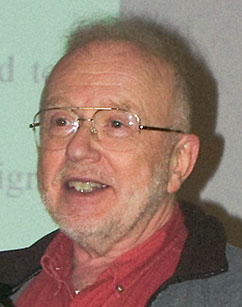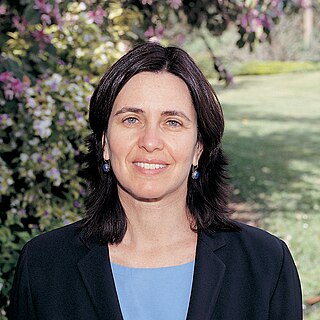Related Research Articles

David Lorge Parnas is a Canadian early pioneer of software engineering, who developed the concept of information hiding in modular programming, which is an important element of object-oriented programming today. He is also noted for his advocacy of precise documentation.

John Leroy Hennessy is an American computer scientist who is chairperson of Alphabet Inc. (Google). Hennessy is one of the founders of MIPS Technologies and Atheros, and also the tenth President of Stanford University. Hennessy announced that he would step down in the summer of 2016. He was succeeded as president by Marc Tessier-Lavigne. Marc Andreessen called him "the godfather of Silicon Valley."

Judea Pearl is an Israeli-American computer scientist and philosopher, best known for championing the probabilistic approach to artificial intelligence and the development of Bayesian networks. He is also credited for developing a theory of causal and counterfactual inference based on structural models. In 2011, the Association for Computing Machinery (ACM) awarded Pearl with the Turing Award, the highest distinction in computer science, "for fundamental contributions to artificial intelligence through the development of a calculus for probabilistic and causal reasoning". He is the author of several books, including the technical Causality: Models, Reasoning and Inference, and The Book of Why, a book on causality aimed at the general public.

Shafrira Goldwasser is an Israeli-American computer scientist and winner of the Turing Award in 2012. She is the RSA Professor of Electrical Engineering and Computer Science at Massachusetts Institute of Technology; a professor of mathematical sciences at the Weizmann Institute of Science, Israel; the director of the Simons Institute for the Theory of Computing at the University of California, Berkeley; and co-founder and chief scientist of Duality Technologies.

Charles Eric Leiserson is a computer scientist and professor at Massachusetts Institute of Technology (M.I.T.). He specializes in the theory of parallel computing and distributed computing.

Mahadev "Satya" Satyanarayanan is an Indian experimental computer scientist, an ACM and IEEE fellow, and the Carnegie Group Professor of Computer Science at Carnegie Mellon University (CMU).

Randal E. Bryant is an American computer scientist and academic noted for his research on formally verifying digital hardware and software. Bryant has been a faculty member at Carnegie Mellon University since 1984. He served as the Dean of the School of Computer Science (SCS) at Carnegie Mellon from 2004 to 2014. Dr. Bryant retired and became a Founders University Professor Emeritus on June 30, 2020.
Chung Laung Liu, also known as David Liu or C. L. Liu, was a Taiwanese computer scientist. Born in Guangzhou, he spent his childhood in Macau. He received his B.Sc. degree in Taiwan, master's degree and doctorate in the United States.
Edward Joseph McCluskey was a professor at Stanford University. He was a pioneer in the field of Electrical Engineering.

Manuela Maria Veloso is the Head of J.P. Morgan AI Research & Herbert A. Simon University Professor Emeritus in the School of Computer Science at Carnegie Mellon University, where she was previously Head of the Machine Learning Department. She served as president of Association for the Advancement of Artificial Intelligence (AAAI) until 2014, and the co-founder and a Past President of the RoboCup Federation. She is a fellow of AAAI, Institute of Electrical and Electronics Engineers (IEEE), American Association for the Advancement of Science (AAAS), and Association for Computing Machinery (ACM). She is an international expert in artificial intelligence and robotics.
Edward S. Davidson is a professor emeritus in Electrical Engineering and Computer Science at the University of Michigan, Ann Arbor.

Oyekunle Ayinde "Kunle" Olukotun is a British-born Nigerian computer scientist who is the Cadence Design Systems Professor of the Stanford School of Engineering, Professor of Electrical Engineering and Computer Science at Stanford University and the director of the Stanford Pervasive Parallelism Lab. Olukotun is known as the “father of the multi-core processor”, and the leader of the Stanford Hydra Chip Multiprocessor research project. Olukotun's achievements include designing the first general-purpose multi-core CPU, innovating single-chip multiprocessor and multi-threaded processor design, and pioneering multicore CPUs and GPUs, transactional memory technology and domain-specific languages programming models. Olukotun's research interests include computer architecture, parallel programming environments and scalable parallel systems, domain specific languages and high-level compilers.
Margaret Martonosi is an American computer scientist who is currently the Hugh Trumbull Adams '35 Professor of Computer Science at Princeton University. Martonosi is noted for her research in computer architecture and mobile computing with a particular focus on power-efficiency.

Rob A. Rutenbar is an American academic noted for contributions to software tools that automate analog integrated circuit design, and custom hardware platforms for high-performance automatic speech recognition. He is Senior Vice Chancellor for Research at the University of Pittsburgh, where he leads the university's strategic and operational vision for research and innovation.

Diana Marculescu is the Department Chair and Motorola Regents Chair in Electrical and Computer Engineering #2 at the University of Texas at Austin. She was formerly the David Edward Schramm Professor of Electrical and Computer Engineering at Carnegie Mellon University. She is the first female chair in the department's history.

ACM SIGARCH is the Association for Computing Machinery's Special Interest Group on computer architecture, a community of computer professionals and students from academia and industry involved in research and professional practice related to computer architecture and design. The organization sponsors many prestigious international conferences in this area, including the International Symposium on Computer Architecture (ISCA), recognized as the top conference in this area since 1975. Together with IEEE Computer Society's Technical Committee on Computer Architecture (TCCA), it is one of the two main professional organizations for people working in computer architecture.

Michael James Carey is an American computer scientist. He is currently a Distinguished Professor (Emeritus) of Computer Science in the Donald Bren School at the University of California, Irvine and a Consulting Architect at Couchbase, Inc..
Adrian Perrig is a Swiss computer science researcher and professor at ETH Zurich, leading the Network Security research group. His research focuses on networking and systems security, and specifically on the design of a secure next-generation internet architecture.
Timothy M. Pinkston is an American computer engineer, researcher, educator and administrator whose work is focused in the area of computer architecture. He holds the George Pfleger Chair in Electrical and Computer Engineering and is a Professor of Electrical and Computer Engineering at University of Southern California (USC). He also serves in an administrative role as Vice Dean for Faculty Affairs at the USC Viterbi School of Engineering.
Harold Stuart Stone is an American computer scientist specializing in parallel computer architecture. He is an IEEE Fellow, and a Fellow of the Association for Computing Machinery (1994).
References
- 1 2 3 4 "Daniel Siewiorek". Carnegie Mellon University. Retrieved September 4, 2022.
- ↑ "Daniel P. Siewiorek • IEEE Computer Society". www.computer.org. 11 April 2018. Retrieved 2019-02-09.
- ↑ University, Carnegie Mellon (2018-06-05). "Press Release: Dan Siewiorek Named Director Of Quality of Life Technology Center - News - Carnegie Mellon University". www.cmu.edu. Retrieved 2019-02-09.
- ↑ "Siewiorek recognized with IEEE Computer Society 2018 Taylor L. Booth Education Award". Carnegie Mellon University: College of Engineering: Electrical and Computer Engineering. February 26, 2018. Retrieved 2019-02-09.
- ↑ "Dr. Daniel P. Siewiorek is Recognized with IEEE Computer Society 2018 Taylor L. Booth Education Award". IEEE Computer Society. 5 April 2018. Retrieved 2019-02-09.